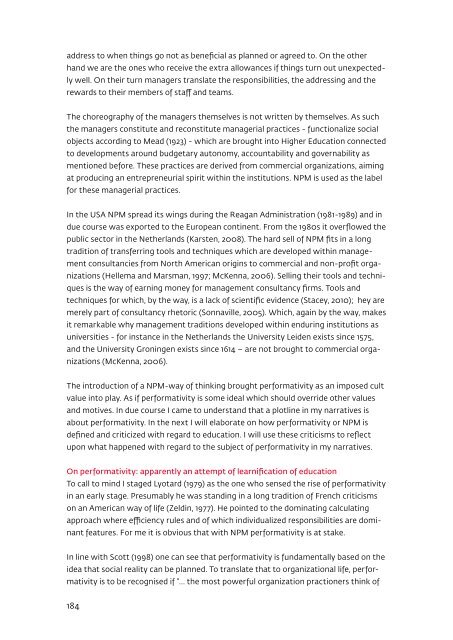Rumbling on performativity_Frits Simon
Rumbling on performativity_Frits Simon
Rumbling on performativity_Frits Simon
You also want an ePaper? Increase the reach of your titles
YUMPU automatically turns print PDFs into web optimized ePapers that Google loves.
address to when things go not as beneficial as planned or agreed to. On the other<br />
hand we are the <strong>on</strong>es who receive the extra allowances if things turn out unexpectedly<br />
well. On their turn managers translate the resp<strong>on</strong>sibilities, the addressing and the<br />
rewards to their members of staff and teams.<br />
The choreography of the managers themselves is not written by themselves. As such<br />
the managers c<strong>on</strong>stitute and rec<strong>on</strong>stitute managerial practices - functi<strong>on</strong>alize social<br />
objects according to Mead (1923) - which are brought into Higher Educati<strong>on</strong> c<strong>on</strong>nected<br />
to developments around budgetary aut<strong>on</strong>omy, accountability and governability as<br />
menti<strong>on</strong>ed before. These practices are derived from commercial organizati<strong>on</strong>s, aiming<br />
at producing an entrepreneurial spirit within the instituti<strong>on</strong>s. NPM is used as the label<br />
for these managerial practices.<br />
In the USA NPM spread its wings during the Reagan Administrati<strong>on</strong> (1981-1989) and in<br />
due course was exported to the European c<strong>on</strong>tinent. From the 1980s it overflowed the<br />
public sector in the Netherlands (Karsten, 2008). The hard sell of NPM fits in a l<strong>on</strong>g<br />
traditi<strong>on</strong> of transferring tools and techniques which are developed within management<br />
c<strong>on</strong>sultancies from North American origins to commercial and n<strong>on</strong>-profit organizati<strong>on</strong>s<br />
(Hellema and Marsman, 1997; McKenna, 2006). Selling their tools and techniques<br />
is the way of earning m<strong>on</strong>ey for management c<strong>on</strong>sultancy firms. Tools and<br />
techniques for which, by the way, is a lack of scientific evidence (Stacey, 2010); hey are<br />
merely part of c<strong>on</strong>sultancy rhetoric (S<strong>on</strong>naville, 2005). Which, again by the way, makes<br />
it remarkable why management traditi<strong>on</strong>s developed within enduring instituti<strong>on</strong>s as<br />
universities - for instance in the Netherlands the University Leiden exists since 1575,<br />
and the University Gr<strong>on</strong>ingen exists since 1614 – are not brought to commercial organizati<strong>on</strong>s<br />
(McKenna, 2006).<br />
The introducti<strong>on</strong> of a NPM-way of thinking brought <strong>performativity</strong> as an imposed cult<br />
value into play. As if <strong>performativity</strong> is some ideal which should override other values<br />
and motives. In due course I came to understand that a plotline in my narratives is<br />
about <strong>performativity</strong>. In the next I will elaborate <strong>on</strong> how <strong>performativity</strong> or NPM is<br />
defined and criticized with regard to educati<strong>on</strong>. I will use these criticisms to reflect<br />
up<strong>on</strong> what happened with regard to the subject of <strong>performativity</strong> in my narratives.<br />
On <strong>performativity</strong>: apparently an attempt of learnificati<strong>on</strong> of educati<strong>on</strong><br />
To call to mind I staged Lyotard (1979) as the <strong>on</strong>e who sensed the rise of <strong>performativity</strong><br />
in an early stage. Presumably he was standing in a l<strong>on</strong>g traditi<strong>on</strong> of French criticisms<br />
<strong>on</strong> an American way of life (Zeldin, 1977). He pointed to the dominating calculating<br />
approach where efficiency rules and of which individualized resp<strong>on</strong>sibilities are dominant<br />
features. For me it is obvious that with NPM <strong>performativity</strong> is at stake.<br />
In line with Scott (1998) <strong>on</strong>e can see that <strong>performativity</strong> is fundamentally based <strong>on</strong> the<br />
idea that social reality can be planned. To translate that to organizati<strong>on</strong>al life, <strong>performativity</strong><br />
is to be recognised if “… the most powerful organizati<strong>on</strong> practi<strong>on</strong>ers think of<br />
184



